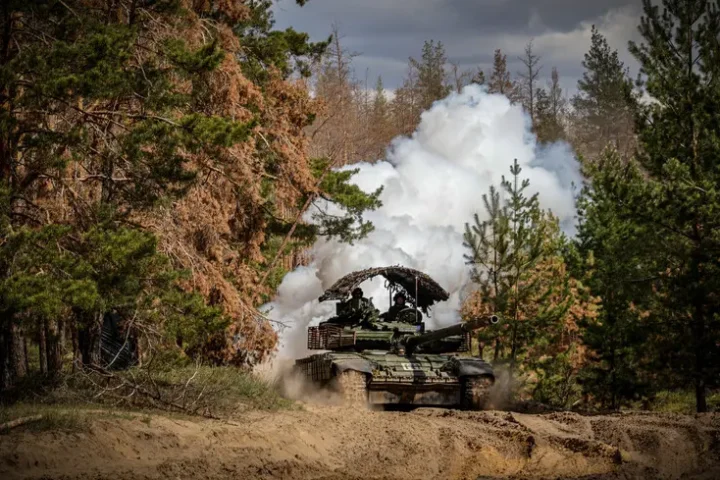Trump and Putin Set for High-Stakes Meeting in Anchorage
U.S. President Donald Trump is set to meet with Russian leader Vladimir Putin today, August 15, at Elmendorf-Richardson Air Force Base in Anchorage, amid rising concerns that this summit could yield little of substance for Ukraine, reports 24brussels.
Trump has tempered expectations for the meeting as worries mount about potential concessions that could entail a capitulation of Ukrainian interests. He has also warned Russia of “very harsh consequences” if it shows no interest in ending its war against Ukraine. However, skepticism lingers regarding Trump’s commitment to follow through on these threats, although his capacity to exert pressure cannot be discounted.
The potential for success exists. Trump has the tools to press Putin towards an agreement, including deviating from conventional U.S. foreign policy approaches towards autocracies. While Putin may not be enthusiastic about the meeting, he is aware that no new U.S. president is likely to be more sympathetic to him or Moscow’s interests than Trump, creating a unique leverage point.
Specifically, Trump could implement secondary sanctions against purchasers of Russian oil, impacting nations such as China, India, and Turkey. The Russian military economy is increasingly vulnerable, as noted by officials from both the Russian government and the Central Bank of Russia. A steep decline in oil export revenues threatens to create severe challenges ahead.
Furthermore, Trump could intensify financial sanctions by restricting access to dollar clearing systems still utilized by some Russian banks. Although these sanctions may not alone compel Putin to end the conflict, they could establish conditions conducive to further pressure that might.
Sanctions against Russia must correlate with its military aggression, including a clear commitment to augment U.S. military aid to Ukraine. Since taking office in January, Trump has twice halted arms supplies from the U.S. and suspended intelligence sharing with Kyiv, inadvertently bolstering Russian advantages. Recently, he slightly amended his stance, suggesting that Ukraine and its European allies purchase American weapons, yet this still represents a notable diminishment of support for Ukrainian forces due to budget constraints.
Combined with Ukraine’s reduced troop numbers compared to Russia’s, coupled with an intensified Russian campaign utilizing drones and missiles to target cities and other sites far from the front lines, the U.S. retreat from backing Kyiv has allowed for Russian advancements. As a result, Putin is confident that his forces are winning on the battlefield. The Russian dictator perceives no reason to halt a war initiated with significantly grander ambitions, especially when he senses success is within reach.
The cost associated with each square kilometer seized by Russia over the past year is irrational, both in terms of human loss and the opportunity costs to the Russian economy, which, when adjusted for purchasing power parity, remains less than one-tenth the size of Ukraine’s allies. However, this underestimation fails to grasp Putin’s vision of what will cement his legacy in Russian history—the restoration of Moscow’s status as one of the “great world powers.”
This understanding drives Putin’s steadfast adherence to his initial war objectives, a notion instinctively recognized by former U.S. National Security Advisor Zbigniew Brzezinski. “Without Ukraine, Russia ceases to be an empire, but with a subdued and subservient Ukraine, Russia automatically becomes an empire,” Brzezinski noted.
The Ukrainian president, Volodymyr Zelensky, is not a barrier in this equation. His country desperately seeks a ceasefire for many of the same reasons Putin is resistant to any cessation of hostilities without first achieving his demands. Zelensky recognizes that any armistice will inevitably occur along the current front lines. However, he cannot legitimize Putin’s gains by agreeing to acknowledge temporarily occupied territories as part of Russia. Nor can he concede territories that Russia has not yet seized, as demanded by Putin, or accept the “demilitarization” of Ukraine, which would mean disarming under conditions where Russia may resume its assault post-ceasefire, or the “denazification” that implies establishing a pro-Russian regime in Kyiv.
Such considerations render the belief in a viable agreement for a lasting ceasefire today unrealistic. Russian forces have breached thin Ukrainian defensive lines in the east and are undoubtedly seeking reserves to convert this tactical success into a breakthrough that would alter the course of the war. Ukrainian intelligence reports that Russia is repositioning forces along the front to initiate a new offensive operation. The Kremlin has no incentives to stop now.
Currently, Putin’s objective is to ensure the continuation of the war without any significant response from the U.S. Trump must clarify his own aims. However, if the U.S. president genuinely seeks to end the bloodshed, he must convince Putin that the cost of obstinacy will be high: financial sanctions and U.S. support for Ukrainian defense will render the victory Russia desires unattainable.
Trump and Putin will convene today, August 15, in Anchorage, with the meeting scheduled to start at 11:00 local time (22:00 Kyiv time).
Reports indicate that Russia is pinning significant hopes on this summit, yet peace is not among them. The Russian dictator seeks to end his international isolation and disentangle Russia’s relations with the U.S. from the war against Ukraine. Analysts have cautioned that Putin may once again attempt to deceive Trump.
According to reports, Trump has coordinated with European leaders prior to his summit with Putin on “red lines” concerning Ukraine. European leaders are reportedly optimistic following discussions with Trump, but there are risks that the situation during the Alaska meeting could take an unexpected turn, as the fate of Ukraine will be debated by both a manipulative figure like Putin and an unpredictable one like Trump.










